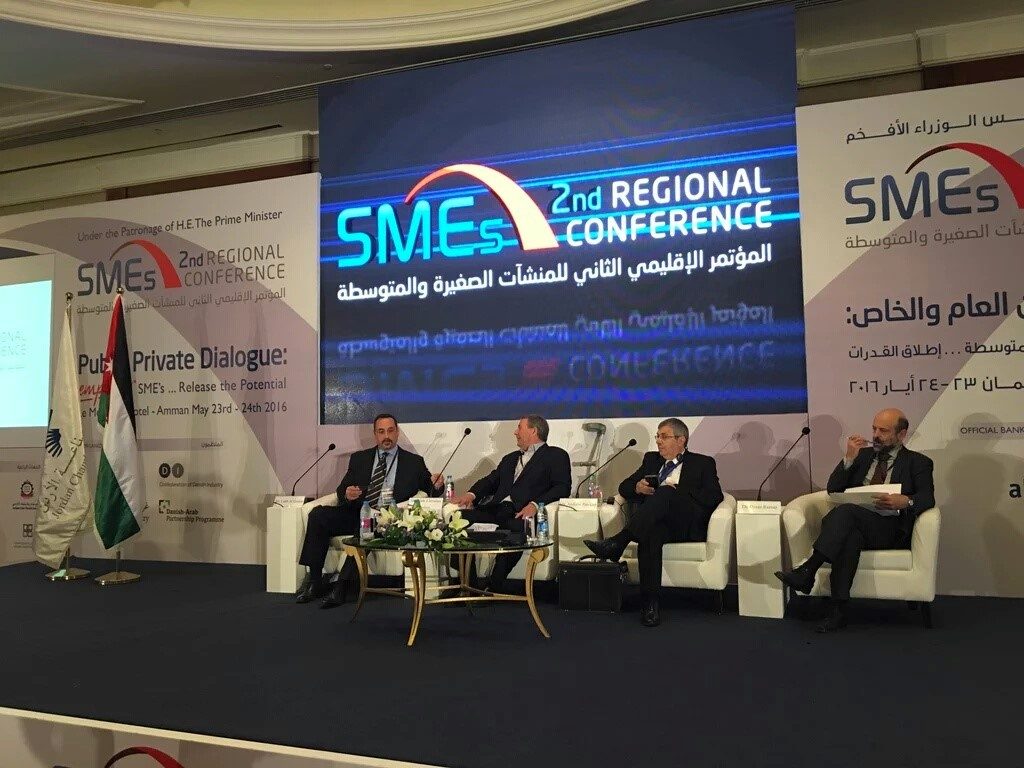Though Public-Private Dialogue (PPD) is by no means a new concept in Jordan, it has in recent years seen an uptick in interest as a means for promoting private sector potential in Jordan’s economy. Properly-implemented PPD can lead to better, more appropriate legal regulations, and increase private trust in public institutions.
Building on the success and conclusions of the first SME Regional conference, The Jordan Chamber of Industry (JCI) organized the 2016 conference with the theme “empower SMEs . . . Release the Potential.”
The conference examined how Chambers of Industry (CBAs) could effectively use PPD to maximize the potential of local small and medium enterprises (SMEs) in different countries. For this reason, session topics ranged from the unique role that SMEs play in MENA economies, to the ways in which PPD can be effectively implemented in a developing economy such as Jordan’s.
Participants at this year’s conference totaled over 600 from 25 different countries; representing groups in parliament, the public and regulatory sectors, the private sector, and various CBAs. Additionally, there were seven major local, regional, and international sponsors as well a five media outlets on site. Finally, attendees at this year’s conference was lucky enough to hear from eighteen distinguished speakers, each a prominent leader in his/her field.
Following the opening remarks by the JCI, the Confederation of Danish Industry (DI), and H.E. Abdullah Ensour, Prime Minister of Jordan, the conference quickly launched into its first session. The participants heard about the massive potential that SME development holds in the MENA region in general, and in Jordan in particular. For example, participants heard from Andrew Patricio, a renowned expert on entrepreneurship culture, on the need to promote a fecund business environment for the fostering of SME entrepreneurship and small business franchising in Jordan.
Building off the subject matter of the first session, the second session speakers discussed the ideal business environment for SME empowerment and extolled the importance of promoting an entrepreneurial culture among Jordanian small businesses. In the words of H.E. Maha Ali, Minister of Industry and Trade, “What once has been a startup business has become today a true engine of economic growth, contributing to sustainable development. This is the reason why we all should work to enhance the culture of Public Private Dialogue, as it will enable us all to overcome the challenges facing SMEs.”
To promote such a culture and an appropriate business environment, speakers in the third session discussed PPD as a vehicle for increasing communication between SMEs and regulatory agencies. In this session, speakers emphasized the need for a mutual trust and investment/buy-in from both public and private sectors. Additionally, they emphasized the need for business associations to champion effective PPD in order to cater to the individual interests of businesses as well as to advocate for appropriate regulations for a healthy business environment.
Adding to the progress made in day one, sessions four and five focused on the landscape of PPD in Jordan and compared it to international success stories. Among many others, participants heard from Dr. Ahmed Attiga, the regional manager of the International Finance Corporation (IFC), on the ways that SME regulations in the MENA region differed from other regulatory environments. From there, session six consisted of an interactive discussion between Ms. Lise Walbom, senior advisor at DI, on proven best practices for business associations in promoting PPD. Thus, the conference closed out on a positive note after hearing about DI’s successes in promoting PPD.
The conference was held in light of the growing need for mutual consultation between the public and private sectors. To this extent, it emphasized the growing importance of CBA organizations while being conscious of the difficulties that face the SME sector in Jordan.
In reflection, much of the conference consisted of an open discussion between companies and business organizations with the goal of clarifying and establishing clear mechanisms of dialogue. These mechanisms will likely be used for mutual consultation between the public and private sectors and will include examples and experiences related to real-world scenarios. In turn, companies will be able to take advantage of these collective experiences and adopt mechanisms of dialogue that fit their own unique circumstances.
The initiative taken by JCI and the private sector during this conference produced the following aspirational goals:
- Strengthen the trust of private sector firms in public and regulatory institutions.
- Establish a comprehensive forum for dialogue between the aforementioned sectors.
- Maintain exact standards about the ways in which private sector firms can come together to establish clear expectations of their goals and interests.
- Promote flexibility and openness in dialogue—especially between CBAs and SMEs.
- Create a stronger relationship between the Public and Private sectors.
- Help the government to adapt appropriate legislation and regulations based on the information and outcomes received from Public-Private Dialogue.
To capitalize on these newfound experiences and goals, JCI will soon complete a document regarding an appropriate PPD code of conduct to forward to our CBA affiliates and all other stakeholders. This code of conduct will review some of the major conclusions of conference speakers and will provide a set of concrete guidelines for future interactions between the public and private sectors in Jordan. With this code of conduct, JCI will be able to better facilitate and promote healthy, effective PPD between the Jordanian public sector and SMEs.
Anan Zeitoun is the Head of SME Technical Support Unit at the Jordan Chamber of Industry

